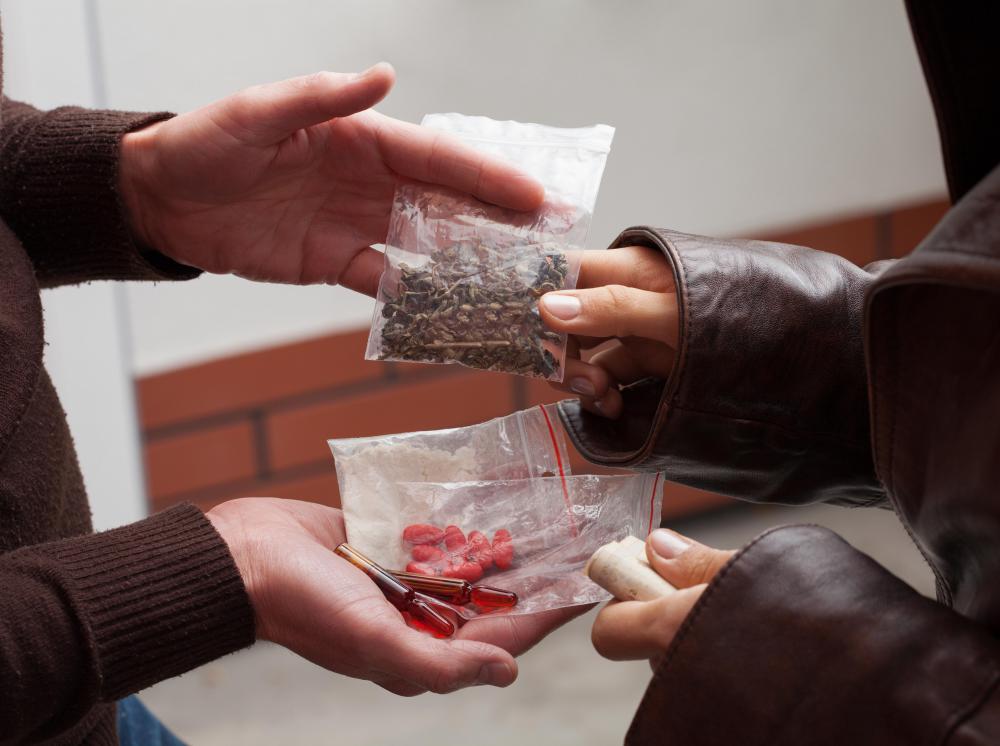At WiseGEEK, we're committed to delivering accurate, trustworthy information. Our expert-authored content is rigorously fact-checked and sourced from credible authorities. Discover how we uphold the highest standards in providing you with reliable knowledge.
What are the Penalties for Drug Possession?
In most regions, possession of illegal or regulated drugs is a criminal offense that can result in many different penalties. Depending on the type of drug, the amount possessed, local laws, and the criminal history of the perpetrator, penalties may include anything from mandated drug treatment to mandatory beheading. Information on specific legal penalties for drug possession is usually available on the law enforcement websites for the region in question.
In the United States, each state has different penalties for drug possession. The type of drug, amount possessed, and prior convictions for possession or trafficking are all basic criteria used to set penalty schedules in the different states. In Connecticut, for instance, a first offender in possession of less than four ounces (115 grams) of marijuana can receive up to a year in prison and a $1,000 US Dollar (USD) fine. In the same state, first time possession of any amount of heroin, cocaine, or crack, is punishable by up to seven years in jail and a $50,000 USD fine.

California recently has been in the headlines for the reduction of prosecution when it comes to marijuana drug possession. Despite federal laws to the contrary, hundreds of medical marijuana dispensaries operate within the state. Governor Arnold Schwarznegger made headlines in 2010 when he signed a bill reducing the classification of possession of small amounts of marijuana from a misdemeanor to an infraction. Penalties for qualifying possession infractions may be charged a fine, but are not eligible for jail time.

Much of Europe classifies drug abuse as a health problem to be treated, rather than a crime to be punished. Though many have strict consequences for trafficking or possession of large amounts of drugs, they tend to offer treatment programs and fines as alternatives to prison for those convicted of misdemeanor drug possession. In Portugal, possession has been decriminalized entirely, as authorities believe it is far more important to bring drug addicts into treatment than to prosecute them for crimes. Lenience is not universal in Europe, however; Greece has an interesting program in which penalties for those believed to be not addicted to drugs are significantly higher than for those deemed to be addicts.

Several countries institute long prison sentences and even the death penalty for drug possession. Iran and Saudi Arabia impose long jail sentences and whipping or flogging for possession. Malaysia and Singapore, meanwhile, have mandatory death penalty sentences for possession of even small amounts of certain drugs, such as heroin.
AS FEATURED ON:
AS FEATURED ON:


















Discussion Comments
Possession with intent and trafficking are the charges that will usually get people in jail for the longest time. Those are the charges that the judge usually won't dismiss or reduce -- unless the person being charged can do something, like lead authorities to a "bigger fish" -- his or her supplier or even farther up the chain.
I'm always interested in reading the arrest reports to see who got charged with drug possession, and what their bail is. I guess people still sell this stuff because of the potential for such big money, and they think they're too smart to get caught. People get caught all the time, though, so usually, it's just a matter of time until they get it, too.
Most places in the US don't consider under a gram of pot to be a felony. It's misdemeanor possession, at worst. If it can be classed as "personal use," most cops aren't anxious to make an arrest, just because most jails are too full as it is, and chances are, if the person doesn't have a criminal record, the judge is just going to let them go anyway.
In general, if a person is honest with the officer about having some pot, they'll write them a citation with an order to appear in court, and will let the person go. That's "in general." It pays to be courteous and honest to a police officer. They can get downright belligerent if you're not, right or wrong.
Post your comments